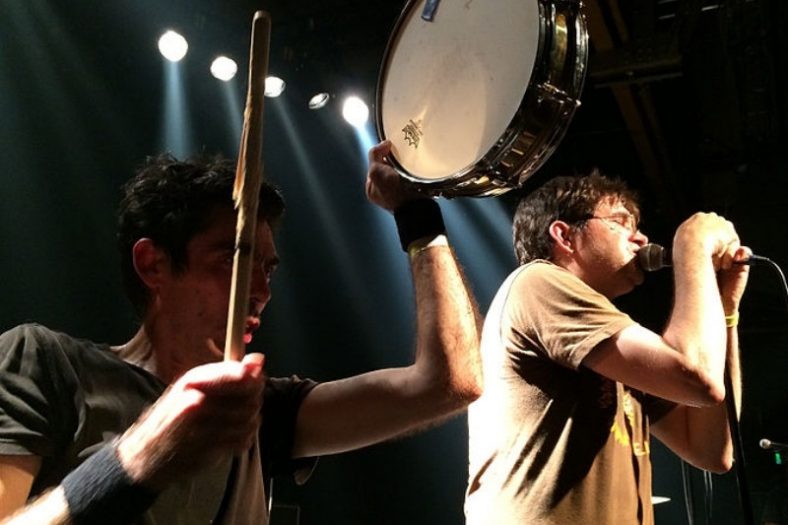The 10 Best Math-Rock Bands Of All Time

Math rock is a subgenre based on complex guitar riffs, unusual harmonies, abrupt changes in style and tempo, and odd time signatures. While many math rock bands feature vocals, the subgenre is mostly instrumental. It combines influences from indie rock, post-hardcore, prog rock, and post-rock.
Created in the late ’80s and popularized in the two following decades, “math rock” was named as such due to its quasi-mathematical rhythmic complexity. While math rock bands sound very different from one another, they’re all based on the same core principles: to explore new song structures and techniques in rock, no matter how strange or complicated. Because most math rock songs feature complex arrangements, the subgenre is also known for its wall-of-sound sonority.
A type of music made for die-hard rock fans, math rock evolved a lot since it first appeared in the late ’80s, drawing in a series of influences from musical spectrums as disparate as metal, jazz, and electronic music. Below, you can find the 10 best math-rock bands of all time.
Contents
1. Shellac
The guys at Shellac are the perennial bad boys of math rock and one of the noisiest rock acts around. Led by the charismatic Steve Albini, the Chicago, Illinois band is repeatedly featured in major alternative music festivals, including Barcelona’s Primavera Sound.
Even though they reject the math-rock tag and view themselves as a “minimalistic rock trio,” it’s undeniable that Shellac is one of the main bands responsible for shaping the math-rock sound. They’re hardcore and violent but they’re also extremely imaginative and cohesive, often subverting rock clichès.
To this day, Shellac’s 1994 debut album “At Action Park” remains their most influential work. While all of their studio albums have been successful and met with enthusiasm by the critics, Shellac’s natural habitat is the stage. To witness their true power, you must watch them perform live.
2. Battles
When everybody thought that math rock wasn’t going to live past the ’90s, a then-new band from New York City came up with the answer to the question “How does the math rock of the future should sound like?” When Battles dropped their hit song “Atlas” in 2007, it was clear to everybody that they weren’t just another math-rock band.
Battles’ debut album “Mirrored” was listed at number one in Pitchfork’s Highest Rated Math Rock Albums of All Time, and was responsible for putting the math-rock sound in the mainstream—including primetime MTV music programs.
Battles are different from most math rock acts around because they present a much cleaner sound and draw influences from electronic music (not only in terms of timbres and textures but also song structure). All of their studio albums are extremely convincing, but “Mirrored” and “La Di Da Di” are probably the best.
3. Drive Like Jehu
There’s one reason why Drive Like Jehu went down in history as a post-hardcore band: because the math rock tag wasn’t as well-known back in the early ’90s. However, it’s undeniable that this short-lived group from San Diego, California is one of the most influential bands in the history of the subgenre.
While indie-influenced math-rock acts thrive on complex guitar riffs, the hard-hitting Drive Like Jehu set themselves apart because of their unusually intricate approach to the fundamentals of punk hardcore. They’re passionate and sweaty, but they do it with hypnotizing complexity and mathematical precision.
Drive Like Jehu was such a unique band that it still populates the imagination of thousands of math-rock fans today, more than two decades after its disbandment. They existed between 1990 and 1995 (and briefly between 2014 and 2016) and released only two studio albums, both deemed masterpieces: the self-titled “Drive Like Jehu” and “Yank Crime.”
4. Slint
When rock fans think of the year 1991, “Nevermind” is the record that usually comes to mind. However, some may prefer Slint’s seminal “Spiderland” to Nirvana’s magnum opus. Why? Because it marked a generation of bands to come. Slint’s music was cerebral and smart but also deeply existentialistic, depressive, and longing—much like emo.
With their 1991 masterpiece “Spiderland,” Slint fed on the post-hardcore sound of the likes of Shellac and Drive Like Jehu and combined it with the eerie textures of the post-rock sonority. The result was a timeless record that was somehow devoided of feelings and abundantly emotional at the same time.
Formed in Louisville, Kentucky, Slint was also able to introduce a bluesy, Southern flavor to the math-rock subgenre (mostly popular in New York and California). The band separated for the first time in 1990, before the release of “Spiderland,” but made numerous comebacks, the latest of which was in 2014.
5. American Football
American Football is one of the most special math-rock bands around. They released three albums between 1999 and 2019, all titled “American Football.” Somehow, they are both a great ’90s math-rock group and a phenomenal present-day math-rock band. They’re as historic as they are contemporary, making for arguably the best emo/math rock band ever.
Initially active between 1997 and 2000, American Football made a comeback in 2014 and released two new albums, much to the excitement of their fans. Surely a cult phenomenon, the guys at American Football know how to combine great emo songs with complex math rock arrangements that often go full post-rock and “orchestral.”
If you love the ideas behind math rock but some of the bands are just too rough and heavy for your taste, you may want to check out American Football’s music.
6. Don Caballero
Welcome to the early ’90s: at a time when most alternative rock groups were exploring depressive themes, a band from Pittsburgh, Pennsylvania came up with the idea of gluing math rock and the happy guitar riffs of ’80s indie rock together. That band was Don Caballero and, if their characteristic riffs sound familiar to you, that’s because they were made by the guitarist Ian Williams, who would later create the band Battles.
Like most math-rock acts from the ’90s, Don Caballero has separated and reunited more times than your favorite on-and-off couple. Their output, however, is quite extraordinary: they have released seven studio albums between 1993 and 2014, including the critically acclaimed “What Burns Never Returns.” The Meshuggah drummer Tomas Haake named it one of his favorite albums of all time.
7. Tera Melos
Unlike the early-’90s “gods” of the math rock subgenre, ’00s math rock bands tend to have a cleaner sound, with crisp production and instrumentation but the same energy and passion that’s always characterized the style. Tera Melos is among the top contemporary math rock bands of the hour.
Formed in 2004 in Sacramento, California, they have five original albums out and a legion of cult fans. They’re math-rock through and through, but they also draw influences from punk, noise rock, and even free improvisation.
In an Allmusic article, Tera Melos’ sound is described as a fusion of the violence of punk and the technical intricacy of prog rock. While that leaves out some of their innovations, it does work as a perfect description of what Tera Melos are trying to achieve.
8. CHON
CHON is a math rock band from Oceanside, California that’s been around since 2008. Their debut album, “Grow,” was only released in 2015 but was met with widespread enthusiasm. If technical ability and smart composition are what make you love math rock, then CHON is the right band for you.
Their use of complex harmony and elaborated time signatures is remarkable, especially if you consider how pleasant and accessible most of their songs are. Their jazzy feel derives from musicians such as Tigran Hamasyan and Hiromi Uehara, listed as two of their main influences. While they explore elements of post-hardcore (as most math rock bands do), their sonority can be described as gentle and mellow.
Mostly instrumental, CHON’s latest album (also titled “Chon”) is especially jazzy, drawing inspiration from contemporary jazz fusion acts. From a technical standpoint, they’re arguably the most competent math rock band of the hour.
9. tricot
Don’t get fooled by their name: unlike the art of tricot, tricot (the band) is perfect for getting a party started. There’s an interesting math rock scene in Japan, with tricot being the standout act. They’re among the most renowned math rock bands in the world right now.
Pretty much like CHON, tricot tries to create accessible songs without compromising on the core values of math rock. Their music is complex but accessible at the same time; it helps that tricot’s music focuses extensively on vocals, with the very talented Ikkyu Nakajima serving as the band’s lead singer.
Up until now, tricot’s debut album “T H E” remains their most acclaimed work. However, this band from Kyoto, Japan has already released six high-quality studio albums, with the latest being 2021’s “Jodeki.”
10. TTNG
A list of the best math rock bands of all time couldn’t be complete without This Town Needs Guns, best known as TTNG. They’re probably the most beloved math rock band coming from the United Kingdom, and their music is a finely-balanced combination of math rock and emo music.
Formed in 2004 and still active today, TTNG are emo in their core but work like a breath of fresh air in the genre due to their incorporation of math rock riffs and rhythms. In other words, they’re an emo band capable of pleasing both music experts and angsty teenagers.
Led by the bassist/singer Henry Tremain, TTNG surprised their fans in 2018, with the release of “Animals Acoustic,” an acoustic album inspired by their seminal 2008 record “Animals.” That’s how good TTNG’s songs are: they can stand tall even without all the flourishing that characterizes most math rock music.
Summary
Math rock is a subgenre that’s existed since the late ’80s but only matured in the mid-‘2000s. Ever since pioneers such as Drive Like Jehu and Slint decided to incorporate sophisticated musical notions into their in-your-face post-hardcore music, the subgenre has evolved in multiple directions, dragging influences from all territories of music.
Any list of the 10 best bands of math rock of all time is certainly subjective, but this one covers the evolution of the style from its very beginning to the present day. Hopefully, the future will continue to present us with terrific math rock bands that can bring something new and innovative to the table.
Finally, I believe it’s important to add some honorable mentions to the list, as many top-tier math rock acts were sadly left out of the top 10.
If you want to continue to explore the best math rock has to offer, please check out bands like Delta Sleep, Covet, Totorro, 65daysofstatic, Hella, Minus the Bear, Cap’n Jazz, Marnie Stern, and Lightning Bolt. For a glimpse of what the future of math rock may sound like, you should go listen to black midi’s inventive album “Schlagenheim.”





